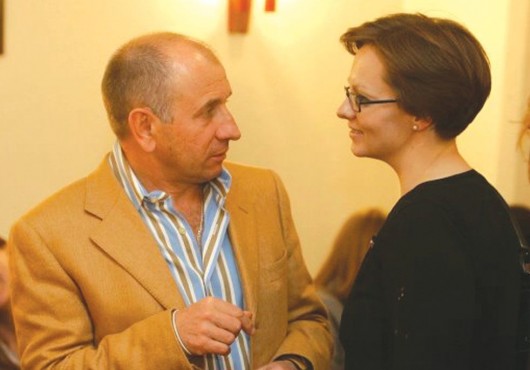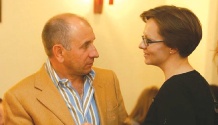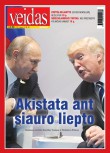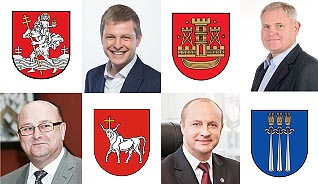
Feliksas Dzeržinskis, founder and leader of the secret Bolshevik police Cheka (Special Commission) known as GPU, OGPU, NKVD and KGB (Committee for State Security) later, came with his mother to Vilnius from Ašmena locality and settled in Paupio Street 128 years ago. There was a F. Dzeržinskis’ Museum at Paupio Str. 26 but it burned down successfully in 2011. However, the KGB spirit remained to live in Paupio Street. Jurij Sagaidak has registered his company there. The same J. Sagaidak used to work undercover as correspondent of “Komsomolskaya Pravda”, and was expelled from United Kingdom in 1989 as a spy. Though J. Sagaidak cannot show up in Britain, Lithuania welcomes him open-armed.
Dovaidas PABIRŽIS
Who is Mr. Jurij Sagaidak and what does his company “Consulit” do in Lithuania? The Private Limited Company “Consulit” registered at Paupio Str. 14-7 near the former F. Dzeržinskis’ Museum outwardly looks nothing special. According to public information, the company registered in 2011 has mere 5 employees. Revenue from sales of the company was 36 thousand Litas and net loss was 24 thousand Litas last year. Nevertheless, an extraordinary fact is that the incorporator of “Consulit” is the KGB agent J. Sagaidak expelled from United Kingdom for spying in 1989.
Glorious biography of the KGB agent
J. Sagaidak entered the Red Flag KGB School named under F. Dzeržinskis in 1967 and successfully graduated from it in five years with the qualification of lawyer capable to speak a foreign language. It is known that J. Sagaidak worked in Indonesia five years and then was an assumed journalist in United Kingdom sent away from the state just before the end of Cold War for being a spy. Moreover, J. Sagaidak is mentioned in the incidents relating to the case of Sergey Magnitsky, the lawyer killed in a Moscow jail. He was also the mover of the propaganda movie made by order of the FSB.
According to sources of “Veidas”, J. Sagaidak easily received permission for temporary residence in Lithuania irrespective of his public identification as the KGB spy. The permission term was extended once and refused only in 2013. The decision was appealed against the Administrative Court of Vilnius Region and then against the Superior Administrative Court of Lithuania but both instances rejected the appeals. According to information available to the Centre of Registers, J. Sagaidak remained Director and Sole Shareholder of “Consulit” until February 2015, and the company has been managed by his namesake Maxim since then.
“Veidas”, the mint of permits for residence, attempted to contact “Consulit”, activities of which is real estate and consulting but they failed. The phone call at the only number indicated was answered by an employee of the company that manages accounts of “Consulit”, who claimed she cannot provide any information because she lacks authority and communicates only with a person authorized by the company herself.
She suggested to look for information in the Internet and when we assured her there was no other phone number indicated and asked, if it was possible to contact representatives of the company in any other way, she fended off “It is impossible, obviously” in reply. However, we managed to learn there are over ten companies like “Consulit” registered in Apt. 7 and 9 at the same Paupio Str. 14: for example, “Viva Investment EU”, “Nika EU”, “Orient Trade”, “Lotus EU” and with other similar meaningless names. It seems these are just names because we failed to contact and learn anything about activity of these mostly single-employee companies.
By the look to their names, incorporators of the companies come from Russia, Ukraine or Azerbaijan. According to information available to the Centre of Registers, both apartments at Paupio Street 14 belong to Kazimiera Nijolė Butkevičienė, mother of Audrius Butkevičius, the first Lithuanian Minister of National Defence after recovery of Independence later convicted for attempted fraud. Perhaps A. Butkevičius could tell us about activities of J. Sagaidak in Lithuania and origin of the mysterious companies?
There are famous surnames among the incorporators of the companies registered at Paupio Street. Arsen Avakov, currently Ukrainian Minister of the Interior, incorporated “Viva investment EU” in January 2012. Incorporator of the liquidated company “Tripe A Capital” is Oleksandr Avakov and Inna Avakova incorporated the “Divia Investment” company currently undergoing liquidation processes. It is not difficult to guess why each family member needed an individual company.
There was a public information on that Lithuania processes the application to reside in Lithuania launched by A. Avakov, comrade-in-arms of Julia Tymoshenko, then accused of the misuse of power in Ukraine, in 2012. A. Butkevičius himself informed the BNS news agency on the fact, “he had had the company in Lithuania long before the article in Ukraine“.
“Veidas” contacted A. Butkevičius, who was in Ukraine. At first he agreed to speak and gave his Ukrainian phone number; however, as soon as he heard our question about the KGB spy J. Sagaidak and his activities, the former Minister of National Defence remembered the “wrongs” done to him by “Veidas”, required an apology by the editorial office and refused to answer any question or communicate with the “defamatory” press until then.
The next day we managed to contact Gražina Šalnaitė, authorized person of “Consulit” entitled to take various actions in relation to status of the company. Her contacts were given by some other companies registered in Apt. 7 or Apt. 9 at Paupio Str. 14 as well. However, after our greeting and introduction, the phone was soon overtaken by A. Butkevičius, “I told you not to call any of my people. No one is going to give an interview. Your magazine has played the deuce with me, so we are not going to speak to you. (…). You can call J. Sagaidak in Moscow and talk to him, if you wish”. A. Butkevičius favoured not to pay attention to our note it is difficult to know in advance, who are “his people”.
A spy with journalist’s credentials
There is information on J. Sagaidak’s past in the Western press. The British paper “The London Evening Standard” published a detailed story of his activities in United Kingdom in 2002. Journalist Valentine Low then met his old acquaintance J. Sagaidak in Moscow to remember 13 years old events, when the alleged journalist of “Komsomolskaya Pravda” worked in London and was expelled from the state for spying. “Thirteen years ago he was an alleged London journalist but MI5 found he was something more and the Government expelled him as a spy.
J. Sagaidak was protesting and proving his innocence, and me, young, maybe naïve and blinded by our friendship, did not know what to think. He was a small dandy, who seemingly liked England very much and who looked so intelligent and great, when we used to meet in a bar to have a beer. Now I know he worked for the Political Section of the Third Department and resigned being Colonel in 1996”, wrote V. Low. As the KGB agent, J. Sagaidak was especially interested in the conservative politician Helen Olga Maitland, better known as Lady Olga Maitland, whom he met in 1987 in Brighton, in a conference of Labour Party. They became good friends, were often meeting and exchanging presents.
However, H. O. Maitland was informing the British intelligence (MI5) about their conversations and detailed J. Sagaidak’s questions until they gradually collected evidence and, finally, sent J. Sagaidak away from the state as the KGB agent. J. Sagaidak refused to discuss the UK spying story with W. Low. “Don’t ask me about what happened before 1996; it is forbidden”, told Jurij to the British journalist and followed the official version he was working as a journalist in 1987–1989 in United Kingdom.
The former politician H. O. Maitland offered much more information to “The London Evening Standard” at that time: “I remember how desperately he tried to get a layout of Downing Street 10 (Government of United Kingdom) with indications where and whose room is. Though such information is available in any guidebook, I used to tell his, where is Margaret Thatcher’s room and everything else. It looked like he absorbed the information with enormous attention to tiniest details. He was always asking about the Government policy and persons. He used to tell he was doing that as a journalist”.
According to H. O. Maitland, people from MI5 called her and asked to let him speak more. “The British intelligence wanted to learn, what particular information is interesting to the Russian. His activity was quite loud. He should have known it won’t last long”, generalized the politician. J. Sagaidak’s colleague and good friend Mikhail Bogdanov gave even more details. In his words, successful hunting of the KGB spies by the British in early nineties reduced KGB forces in London significantly and they began desperately look for new staff. J. Sagaidak became one of these after five years of the KGB agent career in Indonesia.
“His job was to build up contacts in the world of policymaking (with members of Parliament, journalists, diplomats, etc.), write cipher reports on local political atmosphere and send them to Moscow. He was very sharp and very professional, a true strategic cadre. It was a real intelligence in Indonesia the opposite of the things we used to do in London”, remembered M. Bogdanov.
Author of the FSB propaganda movie
J. Sagaidak’s name is mentioned in the book “Cinematic Terror. A Global History of Terrorism in Film” by Tony Shaw describing the process of making the propaganda movie “Personal Number” ordered by FSB. Roman Shleynov, editor of the investigative journalism section of “Novaya Gazeta”, contacted J. Sagaidak in relation to a video received from the environment of oligarch Boris Berezovsky, who lived in London, in September 2002, a couple of weeks before the terrorist attack in Dubrovka Theatre in Moscow.
The video showed confession by Aleksej Galkin, officer of Russian military intelligence taken by Chechen rebels, to having participated in blasting blocks of flats in Russia in 1999. According to author of the book, J. Sagaidak explained the video was a part of attempts to destabilize Russian government by B. Berezovsky, whose relations with Chechen block in Moscow had been known since sixties. Several weeks later J. Sagaidak was informed by the Kremlin sources that B. Berezovsky purportedly planned to fly from London to Moscow secretly to help resolving the Dubrovka hostage crisis thus reinforcing his image of a rescuer of Russia.
Then, allegedly, J. Sagaidak thought the episode would be perfect fit for propaganda TV documentary. His fellow TV show host Aleksey Primakov suggested that a movie would be even better. Vladimir Anisimov, former manager of FSB, participated in making the “Personal Number” movie in 2004 as a consultant. The movie shows independent investigation of the blasting blocks of flats in 1999 as a part of a global plan made by Pokrovsky, a fictional magnate living abroad (to be interpreted as B. Berezovsky), in order to discredit special services of Russia. When the plan failed, Pokrovsky allegedly organized the hostage drama in Moscow Circus willing to come back to Russia as hostage rescuer in negotiation on their release. The Russian propaganda movie pictured Georgian Pankisi valley as a circuit of action of Islam terrorists. Russia was blaming Georgia for such things those days.
A party to a scam investigated by S. Magnitsky
J. Sagaidak’s name is also mentioned in the story relating to the case of S. Magnitsky. J. Sagaidak was a court witness in 2005 and told how the “Renaissance Capital” bank, where J. Sagaidak worked as Deputy General Manager, hired Dmitri Klyuev to implement a tax refund plan in a company just obtained by the bank. “Approximately in the year 2002 Mr. Sagiryan introduced me to his good friend Dmitry Klyuev and recommended him as an expert of tax system and tax law. I was asked to organize a tax refund plan recently obtained by “Renaissance Capital”.
The decision to employ Mr. Klyuev as tax consultant was made. The project was successfully implemented within 6 or 8 months having ensured the appropriate court judgements required for such tax recovery”, witnessed J. Sagaidak those days. S. Magnitsky found the plan was exactly the same as the one implemented five years later to steal 230 million dollars from the state and realized that D. Klyuev has been engaged in tax stealing since the year 2002. The russian-untouchables.com portal created by fellows of possibly killed S. Magnitsky, right after the operation J. Sagaidak and D. Klyuev incorporated the “Avrora-Travel” company in 2003.
The company was terminated only in 2009, when the stories on tax stealing became public. In 2011 J. Sagaidak published a public appeal to oligarch Aleksandr Lebedev in “Kommersant” newspaper expressing his resentment for that A. Lebedev called him the person relating to the case of S. Magnitsky in the letter addressed to V. Putin. According to marker.ru, A. Lebedev complained to V. Putin in the public letter about the raider attempts by, in his words, “werewolves in shoulder-straps” to seize the National Reserve Bank managed by him.
According to A. Lebedev, the “werewolves” and employees of the Central Bank pressurized him personally as well as his relatives and his bank staff. In the words of A. Lebedev, J. Sagaidak and a FSB colonel from “K” Board, who came for an official meeting, argued him a lot into leaving Russia and transferring all assets of the bank to a person indicated by them otherwise threatening him “Bastille jail”. “J. Sagaidak specializes in organization of such raider attacks; he is a mediator between the “werewolves in shoulder-straps” and businesspeople, whose businesses are planned to be taken over.
He was offering me to take over something else but I always rejected his offers. Sometimes he used to bring an assumed FSB associate”, told A. Lebedev for marker.ru. The oligarch claimed he did not know the exact role of J. Sagaidak in the case of S. Magnitsky; however, according to information available to him, the name was in the list of persons associated with the case. He was working for “Renessaince Capital” those days and, according to A. Lebedev, was engaged in continuous conflicts with “Hermitage Capital”. J. Sagaidak himself claimed in the reply appeal he really was meeting A. Lebedev but the meetings were organized on the initiative of the latter and none of the FSB associates participated.
The goal is to receive a permit to reside in Lithuania
According to Conservative Arvydas Anušauskas, member of the National Security and Defence Committee of the Seimas, persons identified as the KGB spies and sent right-abouts from a foreign state, stay in the range of vision of our allies and the State Security Department (SSD) in one way or another irrespective of whether an incident happened in 1971, 1989 or any other year. „SSD had an opportunity to put a veto on issuing some permits without much publicity.
There are hundreds of vetoed persons. It is hard to tell what happened in this particular case and if there were any other interests”, commented A. Anušauskas. The member of the Seimas gave an example of Latvia, which automatically fails to grant citizenship to the former KGB staff. “Is it possible to veto ex-KGB staff here in Lithuania? Yes, it is, but not always. None of laws strictly indicates refusal in case of a former KGB associate. His/her work, activity, biography and current behaviour is evaluated. The cases are evaluated very individually.
Sometimes interests of different services intertwine as well. It happens that a person is caught and with the mask off already but services of other states use his/her service for their own benefits”, explained A. Anušauskas. The SSD comment addressed to “Veidas” reads that activity of foreigners in Lithuania (including incorporation of legal entities or business companies) is interesting from the point of view of national security and constantly is in the centre of attention by the institution. Having found possible threats caused by activity of a foreigner, SSD takes preventive measures to neutralize them in each particular case.
In the words of Artūras Paulauskas, Chairman of the National Security and Defence Committee (NSDC) of the Seimas, a person relating to intelligence is always a higher risk factor because, if he/she was expelled from a foreign state, the office undoubtedly had some information. “The permit had to be granted after careful consideration of the issue. I cannot imagine how he could have received such permit without a blessing by our services. It should be checked, why such person was permitted to reside in Lithuania and what information he had offered.
The intelligence is the organization that allows a person to change his/her job and place of residence bet not a nature of his/her activity because of the oath and other things done. I should check in particular but I think he should have been evaluated”, contemplated A. Paulauskas. According to him, Lithuania is usually not the final destination for such agents of Russia; they do not stay here for a long time and travel further. The other reason might be partial legalization: a wanted person receives the permit to reside and partially clears the suspicion away.
When we asked to evaluate the fact that the KGB agent’s company is registered in the apartment of mother of the first Minister of National Defence, A. Paulauskas did not hide his astonishment, “knowing geography of A. Butkevičius’s travels and variety of his activities in those lands, I can see too many coincidences in this matter”. Both members of NSDC of the Seimas agree that the main goal of agents of Russian intelligence is the permit to reside in Lithuania that also grants basically unlimited right to travel European Union. The policy of issuing the permits in Lithuania is very lame: there has been a shadow world of company registration place and fictitious address “business” making money for hundreds and turning thousands Euros over.
“It is a problem and this is why we raise the issue of registering hundreds of companies in a single apartment or garage but the Migration Department actually does not check or control anything. A hundred companies means that someone is obviously engaged in such registrations and makes money from that. These things have lasted too long and we will necessarily fix the mess”, claimed A. Paulauskas. Chairman of the National Security and Defence Committee said he would not be surprised to learn that the permit to reside in Lithuania was granted to J. Sagaidak without any personality checks.
According to him, constantly repeating facts and cases of corruption prove the possibility to “steal by”. “Being aware of the situation in Migration Department, it is no wonder they could have issued the permit to reside without doing any checks. I would not be surprised because, as they explain, if a person has a business here, hires Lithuanian citizens and pays salaries, this is the priority. They pay more attention to such labour relations than to national security”, fumed A. Paulauskas.
What about the last months of activity? The Migration Department refused to inform “Veidas” on issuing the permit to reside for the KGB agent J. Sagaidak making the excuse of… protection of personal information. As Evelina Gudzinskaitė, Directress at interim of the Migration Department, explained, “United Kingdom is not a part of Schengen area. Its information system can be used for judiciary purposes exclusively, and permits to reside do not fall into the scope of use”.
Thus, it is not consulted in the case of issuing permits to reside. Moreover, black lists of United Kingdom are considered national and… do not apply to Lithuania, which is a part of Schengen area. E. Gudzinskaitė emphasized that incorporation of fictitious companies can be the first signs of migration of foreigners and they were noticed five years ago. 35 hundred applications by foreigners either to issue or replace the permit to reside on the grounds of their legal activity were received in 2012, and this is 2.4 times more than in 2010. It was enough to be an owner or co-owner of a company registered in Lithuania and own a share of the authorized capital net value of which is minimum 50 thousand Litas for a foreigner (irrespective of whether coming from a NATO member state or the East) to receive or replace his/her permit to reside in Lithuania.
Do we need to explain that the authorized capital of “Consulit”, UAB was exactly the one? The law did not provide a possibility to refuse issuing or replacing the permit to the foreigners declaring a fictitious legal activity. It was very easy for a foreigner to obtain a company registered in Lithuania because the companies managed by Lithuanian citizens were busily engaging in the business of company incorporation and selling to foreigners. No one used to check such companies fundamentally. Much stricter policy obliging a foreigner’s company to operate minimum 6 months, establish minimum three workplaces and have minimum 28 thousand Euros authorized capital, half of which must be the foreigner’s own capital, came to its effect only in November 2014.
According to information available at the Migration Department, issue or replacement of the permits to reside was refused to 324 persons last year on the basis that they incorporated or obtained fictitious companies and provided misleading information. E. Gudzinskaitė assured “Veidas” that they always consult the Police and the SSD before issuing any permit to reside. However, obligation to wait for an answer by the said institutions before issuing a permit was imposed only in November 2014. Despite of the fact, it appeared that the permit to reside in Lithuania was granted to the Russian criminal, the so-called legal thief, Akhmed Yevloyev in February 2015. This and similar cases must have probably caused the Government to make their decision in March 2015 to eliminate the Migration Department and transfer its functions to the Ministry of the Interior and the State Border Guard Service.
As Saulius Skvernelis, Minister of the Interior, emphasized, it was an excess institution responsible for technical work exclusively. However, the decision will have to be approved by the Seimas. As far as the chaos rules migration policy and management it is not a surprise that the firm owned by the KGB agent kicked out from England exists in the same street, where F. Dzeržinskis, the founder of Cheka legion, once lived, and in the apartment that belongs to mother of the former Minister of National Defence. We wonder what it actually does in Lithuania. Perhaps the SSD could answer the question.


































